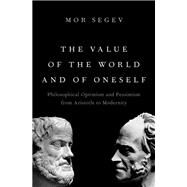The Value of the World and of Oneself Philosophical Optimism and Pessimism from Aristotle to Modernity
, by Segev, Mor- ISBN: 9780197634073 | 0197634079
- Cover: Hardcover
- Copyright: 6/14/2022
Philosophical optimists maintain that the world is optimally arranged and is accordingly valuable, and that the existence of human beings is preferable to their nonexistence. Philosophical pessimists, by contrast, would prefer human nonexistence, considering the world to be in a woeful condition and ultimately valueless. The Value of the World and of Oneself examines the longstanding debate between philosophical optimism and pessimism in the history of philosophy, focusing on Aristotle, Maimonides, Spinoza, Schopenhauer, Nietzsche, and Camus.
Author Mor Segev examines how Schopenhauer criticizes the optimism he locates in the Hebrew Bible and in Spinoza for being unable to square the presumed perfection of the world and its parts, including human life, with the suffering and misfortunes observable in them, and for leading to egoism and thereby to cruelty. Nietzsche, in turn, criticizes Schopenhauer's overtly pessimistic view for furtively positing a perfect state for one to aspire to, thus being latently optimistic. Similarly, Camus charges Nietzsche, who announces his rejection of both optimism and pessimism, with deifying the world and oneself, thereby reverting to optimism. Aristotle countenances an optimistic theory, later adopted and developed by Maimonides, that is arguably capable of facing Schopenhauer's challenge. Aristotelian optimism, Segev argues, accounts for the perfection of the world in terms of a hierarchy of value between its parts, with human beings ranked relatively low, and recommends an attitude congruent with that ranking. A wide-ranging survey of the major theorists of optimism and pessimism, The Value of the World and of Oneself reorients our interpretations of crucial thinkers via Segev's remarkable grasp of the philosophical canon's multi-millennial history.
Author Mor Segev examines how Schopenhauer criticizes the optimism he locates in the Hebrew Bible and in Spinoza for being unable to square the presumed perfection of the world and its parts, including human life, with the suffering and misfortunes observable in them, and for leading to egoism and thereby to cruelty. Nietzsche, in turn, criticizes Schopenhauer's overtly pessimistic view for furtively positing a perfect state for one to aspire to, thus being latently optimistic. Similarly, Camus charges Nietzsche, who announces his rejection of both optimism and pessimism, with deifying the world and oneself, thereby reverting to optimism. Aristotle countenances an optimistic theory, later adopted and developed by Maimonides, that is arguably capable of facing Schopenhauer's challenge. Aristotelian optimism, Segev argues, accounts for the perfection of the world in terms of a hierarchy of value between its parts, with human beings ranked relatively low, and recommends an attitude congruent with that ranking. A wide-ranging survey of the major theorists of optimism and pessimism, The Value of the World and of Oneself reorients our interpretations of crucial thinkers via Segev's remarkable grasp of the philosophical canon's multi-millennial history.







